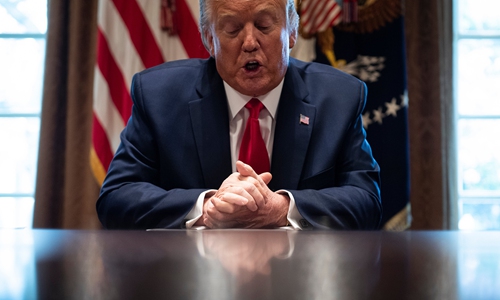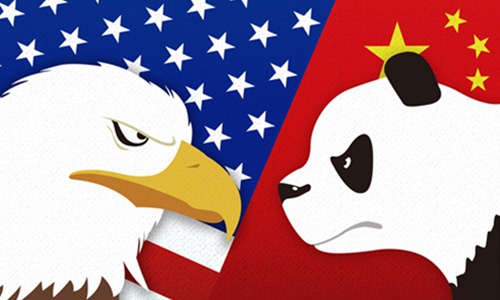
US President Donald Trump makes a statement for the press after a meeting with nursing industry representatives in the Roosevelt Room of the White House about the COVID-19 pandemic on Wednesday in Washington, DC. (Photo: AFP)
US President Donald Trump has referred to the novel coronavirus as "Chinese virus" at least eight times in tweets and media briefings within just two days, fueling widespread xenophobia and racist sentiment and even physical and verbal attacks against Asian Americans and undermining global efforts to contain the deadly virus.
Trump's comment, which is completely against science and facts, could also further promote already-growing populism and racism around the world amid the global pandemic that could plunge countries and regions that have been hit severely by the disease into further disarray and dark abyss, observers warned.
After tweeting several times "Chinese virus" to shift the blame to China, Trump insisted on calling it a "Chinese virus" because "it comes from China," in response to a question from an American journalist on Wednesday. Growing numbers of Asian Americans have been frustrated by the labels of "Chinese virus" or "kung flu," which risk turning them into a target of hatred and retaliation as the pandemic unfolds quickly in the country.
Trump started to use the term "Chinese virus" on Monday in six of his tweets, despite Vice President Mike Pence, head of the country's coronavirus task force, still called it "coronavirus" on Wednesday. Trump stressed it is a Chinese virus twice in his opening remarks at a White House meeting on Tuesday and Wednesday. The White House even backed it up by tweeting that the "Spanish Flu, West Nile Virus, Zika and Ebola were named after places."
The coronavirus pandemic has so far claimed 220,000 infections worldwide,
Apart from Trump, other US officials, including Secretary of State Mike Pompeo, GOP lawmakers Tom Cotton, Paul Gosar and Minority Leader Kevin McCarthy have been using terms like New virus and Chinese virus in public, intentionally stigmatizing China and Wuhan.
Downplaying his racist rhetoric, Trump argued he wanted to be accurate as he believed the virus comes from China, totally ignoring the impact on the Asian community, according to observers, local residents and some influencers.

(Photo: Global Times)
Offensive and immoral
On Wednesday, Trump dubbed the coronavirus "Chinese virus" three times in an hour, according to media reports, which seriously infuriated not only Chinese people but also many Asian Americans. Given the rising crimes against Asian and Chinese communities, some urged Trump to resign as such blunt incitement of racism is so dangerous that it could tear the world apart.
Some even shared their personal stories on social media about being insulted or attacked because of their skin color, ethnic group or nationality since the outbreak, and some said they don't feel safe and feel severely offended, because racist terms encourage xenophobia and discrimination, which could last longer than the pandemic itself.
Jordan Matsudaira, an Asian-looking professor in New York, said his "children are being called 'coronavirus' in school, and this is racist, vile and intentional," in a tweet.
And Cenk Uygur, a Los Angeles-based online news show host, said as his wife is from Taiwan that his children's classmates are already blaming them "for the virus" and some ask them if they eat bats, because of "racists and a**holes like Senator John Cornyn and Trump."
A New York-based Chinese woman, who preferred not to be named, shared an anecdote with the Global Times on Thursday that when she drove and waited at a traffic light one day, an American originally from Mexico spat at her car window, shouting, "F**king virus Chinese," which "made her really sick," she said.
The Atlantic Council's Digital Forensic Research Lab (DFRLab) said in a recent article that continuing calling COVID-19 Chinese virus could be used to denigrate a group and implicitly blame Chinese people for the outbreak, despite the World Health Organization's stepped up efforts to push back against stigmatizing terms that needlessly divide COVID-19 rhetoric.
The WHO came up in 2015 with guidelines on naming diseases, claiming that geographic locations, people's names, animal species or food, cultural, population, industry or occupational references and those inciting undue fear should be avoided in disease names, after the organization saw certain disease names provoke a backlash against members of particular religious or ethnic communities, according to its website.
Some American scientists and medical experts also showed their support for WHO's naming of COVID-19, emphasizing that it should not spark any political debates.
Some prominent figures in Chinese science circles also joined in to fight the 'Chinese virus' slander. Rao Yi, president of Capital Medical University in Beijing, said in a WeChat article on Wednesday that according to the US government's logic, the first AIDS case was reported in the US on June 5, 1981, so should AIDS be called an American venereal disease and HIV the "American venereal virus?"
And should the spirochete leading to syphilis, which is widely considered to have originated in North America and transmitted to Europe by the Spanish, be called "North American spirochete?" he asked.
"Those officials who called it 'Chinese virus' are among those who have the lowest moral standards," Lü Xiang, a research fellow on US studies at the Chinese Academy of Social Sciences in Beijing, told the Global Times on Thursday.
Take at look at what US Secretary of Commerce Wilbur Ross on January 30 said about the deadly virus, that it would help accelerate the return of jobs to the US. That claim reflected their true intention and deeply-rooted wishes that the virus could only spread in China, from which they could take advantage of, Lü said.
However, observers warned that rising hatred toward certain ethnic groups, entangled in the rise of right-wing populism amid the outbreak, would accelerate divisions and confrontations across the globe, which would also be dangerous and harmful following racial animosity and deaths from despair amid the outbreak.
Shift the blame
Eduardo Bolsonaro, Brazilian congressman, said in a tweet that what's happening now is HBO's TV series "Chernobyl," blaming China for the coronavirus outbreak, reflecting some countries' relentless efforts to pass the buck to Beijing and hide their own incompetence in curbing the virus spread across local communities, analysts said.
On Wednesday, a Danish education studio was revealed to have published an insulting song to introduce the novel coronavirus to children that contained lyrics like, "I am a new virus, I come from China," triggering a backlash on Chinese social media. The incident happened about two months after a major Danish newspaper published a cartoon with the five stars on China's national flag replaced by five coronavirus images.
"It's inevitable that populism would be prevalent in the future, and it has become a common practice that specific groups would be targeted by hostility and hatred, which would have severe consequences," Zhang Yiwu, a cultural professor at Peking University, told the Global Times.
Still, some US politicians, including Democrats like Joe Biden, have publicly criticized such inflammatory coronavirus rhetoric, and Biden was quoted as saying in media reports that "labeling COVID-19 a foreign virus does not displace the accountability for the misjudgments that have taken place so far by the Trump administration."
"This is also a tactic that these US politicians use to redirect public attention by shifting suspicions over their incompetence to hatred toward China, but it won't work, and the collapse on Wall Street proves it," Lü said.


